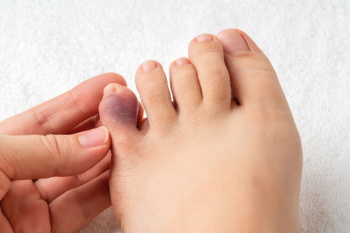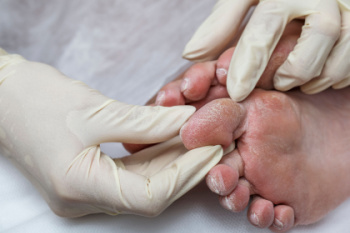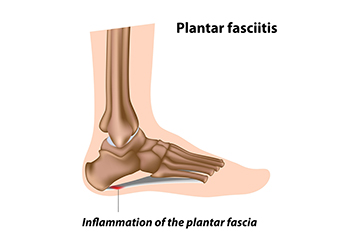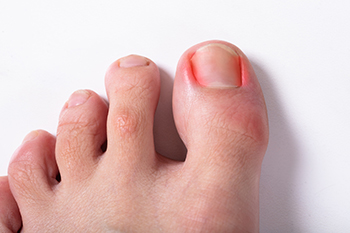Connect With Us
Blog
Items filtered by date: March 2024
Heel Pain in the Morning?
Toe Pain and the Impact of a Broken Toe

Experiencing toe pain due to a broken toe is an all-encompassing challenge that can disrupt daily life and mobility. A broken toe, often resulting from trauma or injury, can cause sharp pain, swelling, and difficulty bearing weight on the affected foot. The pain emanates from the fracture site, creating discomfort with each step and hindering the simplest of movements. Beyond the physical sensations, the inconvenience of managing daily tasks becomes palpable, as even the act of wearing shoes can exacerbate the pain. It is important to recognize the signs of a broken toe early on and it can help to seek medical attention from a podiatrist. While the road to recovery may be challenging, understanding the nature of toe pain from a broken toe and adhering to recommended treatments can significantly enhance the healing process and minimize long-term complications. If you have endured a broken toe, it is suggested that you visit this type of doctor who can guide you toward treatment and relief techniques.
Toe pain can disrupt your daily activities. If you have any concerns, contact one of our doctors of New Jersey and New York. Our doctors can provide the care you need to keep you pain-free and on your feet.
What Causes Toe Pain?
Most severe toe pain is caused due to a sports injury, trauma from dropping something heavy on the toe, or bumping into something rigid. Other problems can develop over time for various reasons.
Toe pain can be caused by one or more ailments. The most common include:
- Trauma
- Sports injury
- Wearing shoes that are too tight
- Arthritis
- Gout
- Corns and calluses
- Hammertoe
- Bunions
- Blisters
- Ingrown toenails
- Sprains
- Fractures (broken bones)
- Dislocations
When to See a Podiatrist
- Severe pain
- Persistent pain that lasts more than a week
- Signs of infection
- Continued swelling
- Pain that prevents walking
Diagnosis
In many cases the cause of toe pain is obvious, but in others, a podiatrist may want to use more advanced methods to determine the problem. These can range from simple visual inspections and sensation tests to X-rays and MRI scans. Prior medical history, family medical history, and any recent physical traumatic events will all be taken into consideration for a proper diagnosis.
Treatment
Treatments for toe pain and injuries vary and may include shoe inserts, padding, taping, medicines, injections, and in some cases, surgery. If you believe that you have broken a toe, please see a podiatrist as soon as possible.
If you have any questions please feel free to contact our offices located in Little Silver, NJ and New York, NY . We offer the newest diagnostic tools and technology to treat your foot and ankle needs.
Care for Diabetic Feet

Caring for diabetic feet is imperative for preventing serious problems. Diabetes can lead to nerve damage, known as neuropathy, causing feet to become insensitive to pain, heat, and pressure. Consequently, minor injuries can go unnoticed, leading to infections, ulcers, or even amputation if left untreated. Plus, poor blood circulation associated with diabetes slows wound healing, increasing the risk of infections. Diabetic feet require meticulous care, including regular inspections for cuts, blisters, or sores, as well as maintaining proper hygiene. Trimming toenails straight across reduces the risk of ingrown nails and potential infections. It is essential to wear well-fitted shoes and socks to prevent rubbing and pressure points that can lead to skin breakdown. If you have diabetes, it is strongly suggested that you schedule an appointment with a podiatrist for routine foot checks for early detection of any issues.
Diabetic foot care is important in preventing foot ailments such as ulcers. If you are suffering from diabetes or have any other concerns about your feet, contact one of our doctors from New Jersey and New York. Our doctors can provide the care you need to keep you pain-free and on your feet.
Diabetic Foot Care
Diabetes affects millions of people every year. The condition can damage blood vessels in many parts of the body, especially the feet. Because of this, taking care of your feet is essential if you have diabetes, and having a podiatrist help monitor your foot health is highly recommended.
The Importance of Caring for Your Feet
- Routinely inspect your feet for bruises or sores.
- Wear socks that fit your feet comfortably.
- Wear comfortable shoes that provide adequate support.
Patients with diabetes should have their doctor monitor their blood levels, as blood sugar levels play such a huge role in diabetic care. Monitoring these levels on a regular basis is highly advised.
It is always best to inform your healthcare professional of any concerns you may have regarding your feet, especially for diabetic patients. Early treatment and routine foot examinations are keys to maintaining proper health, especially because severe complications can arise if proper treatment is not applied.
If you have any questions please feel free to contact our offices located in Little Silver, NJ and New York, NY . We offer the newest diagnostic and treatment technologies for all your foot and ankle needs.
Common Causes of Plantar Fasciitis

Plantar fasciitis, a common cause of heel pain, can arise from various factors related to foot mechanics, lifestyle, and health conditions. One primary cause is repetitive strain on the plantar fascia, the thick band of tissue that supports the arch of the foot. Activities such as running, walking, or standing for prolonged periods can put stress on the plantar fascia, leading to microtears and inflammation. Poor foot mechanics, including high arches, flat feet, or abnormal walking patterns, can also contribute to the development of plantar fasciitis by placing excess strain on the plantar fascia. Additionally, wearing unsupportive footwear or suddenly increasing activity levels can exacerbate the condition. Certain risk factors such as obesity, age, and occupations that require standing or walking for extended periods of time can increase susceptibility to plantar fasciitis. If you have heel pain, it is strongly suggested that you are under the care of a podiatrist who can effectively treat plantar fasciitis.
Plantar fasciitis can be very painful and inconvenient. If you are experiencing heel pain or symptoms of plantar fasciitis, contact one of our doctors from New Jersey and New York. Our doctors can provide the care you need to keep you pain-free and on your feet.
What Is Plantar Fasciitis?
Plantar fasciitis is the inflammation of the thick band of tissue that runs along the bottom of your foot, known as the plantar fascia, and causes mild to severe heel pain.
What Causes Plantar Fasciitis?
- Excessive running
- Non-supportive shoes
- Overpronation
- Repeated stretching and tearing of the plantar fascia
How Can It Be Treated?
- Conservative measures – anti-inflammatories, ice packs, stretching exercises, physical therapy, orthotic devices
- Shockwave therapy – sound waves are sent to the affected area to facilitate healing and are usually used for chronic cases of plantar fasciitis
- Surgery – usually only used as a last resort when all else fails. The plantar fascia can be surgically detached from the heel
While very treatable, plantar fasciitis is definitely not something that should be ignored. Especially in severe cases, speaking to your doctor right away is highly recommended to avoid complications and severe heel pain. Your podiatrist can work with you to provide the appropriate treatment options tailored to your condition.
If you have any questions please feel free to contact our offices located in Little Silver, NJ and New York, NY . We offer the newest diagnostic and treatment technologies for all your foot and ankle needs.
What Is an Ingrown Toenail?
 Ingrown toenails are a common and often painful foot condition that occurs when the edge of a toenail grows into the surrounding skin. Redness, swelling, and tenderness often accompany an ingrown toenail, which can cause discomfort when walking. The big toe is the most common site for ingrown toenails to appear. Possible causes include improper nail trimming, wearing tight shoes, or sustaining foot injuries. People with naturally curved or thick nails can be more prone to ingrown toenails. Conservative treatments for an ingrown toenail include warm foot soaks and proper nail care, while surgical approaches may be used in more severe cases. Podiatrists specialize in treating ingrown toenails. If you are suffering from an ingrown toenail, it is suggested you make an appointment with this type of doctor who offers treatment options.
Ingrown toenails are a common and often painful foot condition that occurs when the edge of a toenail grows into the surrounding skin. Redness, swelling, and tenderness often accompany an ingrown toenail, which can cause discomfort when walking. The big toe is the most common site for ingrown toenails to appear. Possible causes include improper nail trimming, wearing tight shoes, or sustaining foot injuries. People with naturally curved or thick nails can be more prone to ingrown toenails. Conservative treatments for an ingrown toenail include warm foot soaks and proper nail care, while surgical approaches may be used in more severe cases. Podiatrists specialize in treating ingrown toenails. If you are suffering from an ingrown toenail, it is suggested you make an appointment with this type of doctor who offers treatment options.
Ingrown toenails can become painful if they are not treated properly. For more information about ingrown toenails, contact one of our doctors of New Jersey and New York. Our doctors can provide the care you need to keep you pain-free and on your feet.
Ingrown Toenails
Ingrown toenails occur when a toenail grows sideways into the bed of the nail, causing pain, swelling, and possibly infection.
Causes
- Bacterial infections
- Improper nail cutting such as cutting it too short or not straight across
- Trauma to the toe, such as stubbing, which causes the nail to grow back irregularly
- Ill-fitting shoes that bunch the toes too close together
- Genetic predisposition
Prevention
Because ingrown toenails are not something found outside of shoe-wearing cultures, going barefoot as often as possible will decrease the likeliness of developing ingrown toenails. Wearing proper fitting shoes and using proper cutting techniques will also help decrease your risk of developing ingrown toenails.
Treatment
Ingrown toenails are a very treatable foot condition. In minor cases, soaking the affected area in salt or antibacterial soaps will not only help with the ingrown nail itself, but also help prevent any infections from occurring. In more severe cases, surgery is an option. In either case, speaking to your podiatrist about this condition will help you get a better understanding of specific treatment options that are right for you.
If you have any questions please feel free to contact our offices located in Little Silver, NJ and New York, NY . We offer the newest diagnostic and treatment technologies for all your foot and ankle needs.

